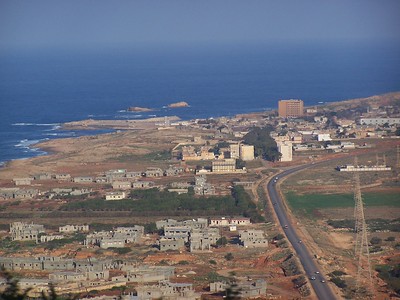A Major Cause of Libya’s Tragic Flood? Western Failure.
Andrea Hebel
Editor-in-Chief
It was 3 a.m. when the first dam broke.
Residents of Derna, a coastal city of 120,000 in Libya, had no idea that a “tsunami,” as The New York Times reports residents later called the deluge of water racing through the Wadi Derna valley, was headed their way on September 11. Until it was too late.
The water, caused by the massive Storm Daniel in the Mediterranean Sea, stalled for mere minutes before a second dam gave way. The water had no mercy, and the residents had no warning, except for the sounds of the dam cracking. By dawn, as The Washington Post describes, a 23-foot-tall wave engulfed the city, leaving devastation in its wake.
It may be weeks, or months, before the true death toll is learned. It is believed that as much as one-sixth of the city’s population was wiped out in minutes. In Derna, those who have not fled remain to look for survivors, but hope is dimming.
To experts, the collapse of the dam is the unimaginable result of years of warnings, The New York Times says. The dams were built in the 1970s by engineers who did not understand the terrain and rainfall patterns of the region, increasing desertification has made the region more susceptible to flooding in recent years, and corruption and infighting amongst political leaders has led to a failure to maintain the dams in the years since their construction.
As The Associated Press describes, Libya’s government has been controlled by two separate factions since 2014, each claiming sovereignty over the other and backed by various international parties and militias. While both sides have pledged to assist in relief efforts, they have no record of cooperation, with the ceasefire in their civil war just brokered in 2020. Both sides have been rife with corruption, leading to significant unrest.
Libya’s government has been in flux since its participation in Arab Spring, during which the crackdown on protestors by Libya’s 42-year dictator Muammar Gaddafi was so severe the United Nations passed a resolution calling for the international community to protect the Libyan people. NATO declared an intervention, which left Gaddafi dead and nebulous leadership in his wake. Though the removal of Gaddafi was certainly a liberation to the Libyan people, who were relieved from a brutal authoritarian regime, the mission failed to consider the future of Libyan politics and governance. As Fund for Peace explains, the state lacked the institutions necessary to create effective governance and public policy. The state’s political system devolved as over 60 independent militias vied for power, each backed by different international actors. The government declined to such a degree that the state was declared the “most-worsened” country of the 2010s by the Fragile State Index.
This is where Western failure begins. During the 2011 intervention, former U.S. President Barack Obama stated that regime change was not NATO’s goal and Gaddafi was not a target. Yet, as Foreign Policy describes, NATO turned a blind eye to western assistance of rebel groups, and even targeted a convoy of loyalists with drone attacks, injuring the dictator, who was eventually captured and murdered by rebels.
But because regime change was not their goal, nation building was not either, as Fund for Peace continues. As such, a fragile post-war Libya received almost no international support from the U.S. or any other post-war allies. It was not until 2014 that the U.S. suggested providing aid to Libya’s security situation – long after institutional capacity and development programs would have held the most weight. By semi-inadvertently collapsing its government and leaving a fledgling nation to rebuild from dust, Western nations failed to see their mission through, and little things like infrastructure fell through the cracks. And now, thousands are dead.
But the failures do not stop there. One also must consider what caused the deadliest “Medicane,” a Mediterranean storm with the intensity of a hurricane, ever recorded, by a magnitude of tens of thousands. Nature describes that while it cannot be for certain whether specific events are worsened or explicitly caused by climate change, there is, at this point, a “clear causal link.” Adding to this, climate scientist Scott Denning wrote in The Conversation, “Unprecedented heat and downpours and drought and wildfires aren’t ‘caused by climate change’ – they are climate change.”
It’s no secret that Western nations are the biggest contributors to climate change, and while the impacts are felt – see the massive heat waves across Europe and forest fires in Western Canada this summer – it is undoubtedly the poorest and most unstable nations that suffer the most. From breaking down infrastructure, to desertification and drought ruining agricultural harvests, to sea level rise threatening to put coastlines and island nations underwater, climate poverty is real and getting worse. And in some places, it is too late.
The West has a responsibility to help Derna pick up the pieces – it is the least they can do after a decade of neglect. People in places like Libya have suffered enough. In tragedy, may Western nations find the will to do the right thing and reverse their wrongs.
Image courtesy of Flickr


